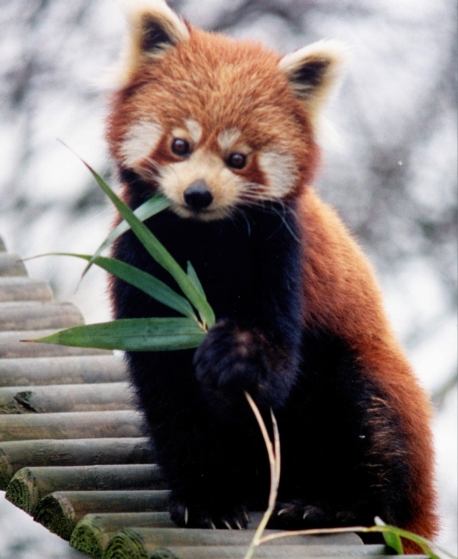Pichu, a female red panda (Ailurus fulgens) at a conservation park in southern Scotland, is set to be part of captive breeding efforts following the introduction of a new possible mate. Ruben, a young male, has been relocated from Paignton Zoo in Devon, to accompany the previously alone Pichu at Galloway Wildlife Conservation Park.
Breeding programmes are an important part of conservation planning for species with low population numbers, such as the red panda of which less than 10,000 adults are believed to exist. This allows scientists to monitor population growth and breeding behaviour, as well as protecting vulnerable mothers and young. Captive breeding programmes have been successful in protecting a wide variety of species from extinction, the Arabian oryx (Oryx leucoryx) and Przewalski’s horse (Equus ferus przewalskii) have been reintroduced to the wild as a result. But they are not without their challenges. The giant panda (Ailuropoda melanoleuca) is famous for its apparent loss of interest in breeding once captured; whilst organisations such as the European Endangered Species Programme (EEP) must manage inbreeding problems and sustain genetic diversity.
Endemic to the Himalayas, red panda populations began to decline as a result of deforestation and harvesting for fur. Livestock trample the bamboo on which red pandas feed, and as human development spreads, panda populations become increasingly isolated. Overall, a decline of ~40% has been estimated for populations in China over the past 50 years. The IUCN has listed red pandas as vulnerable, and trading has been banned by CITES. Although protected in all of its range, conservation efforts vary: population estimates are unavailable for Burma and Bhutan where they have been known to be confused with civets, and poaching still occurs.
Red pandas have shown adaptability to living in captivity, where ~800 individuals are currently held. Breeding rates are high across many zoos, the Padmaja Naidu Himalayan Zoological Park (Darjeeling, India) has successfully released four captive bred pandas to the wild, whilst many more have been born in captivity.

